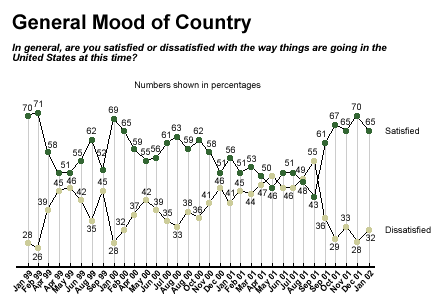There are a number of reasons why Americans would be less than positive about the way things are going in the United States. The nation has suffered through devastating terrorist attacks, a global war on terrorism, the sudden and deadly appearance of anthrax, and the deterioration of our national economy into what is widely agreed to be a full-fledged recession.
Yet Gallup data show a remarkable resilience among Americans -- a rally effect in response to last fall's events that has resulted in as positive an outlook on the state of the country as we have seen in years.
As President Bush delivers his State of the Union address tonight, it will be in the context of some of the highest job-approval ratings in Gallup Poll history. The majority of Americans also profess a general satisfaction with the state of the nation, and even in the midst of recession, almost half say that the economy is getting better -- and that is the highest such optimism rating Gallup has measured in more than a year.
High Approval All Around
The question Gallup has used for almost 25 years to assess the people's view of the state of the union is straightforward: "Are you satisfied or dissatisfied with the way things are going in the United States at this time?" This month's response -- 65% said "satisfied" -- is just six points shy of the all-time record that occurred in February 1999 just after the end of the Bill Clinton impeachment process. The remarkable finding is that this "satisfaction" number jumped after Sept. 11 -- moving from 43% in early September to 61% in October, 65% in November, and 70% in December. The assessment's strength is particularly apparent when it is compared to some of the low points of the past 25 years: only 12% of Americans were willing to say they were satisfied in July 1979, only 31% in 1990, only 14% in 1992, and as recently as early January 1996, just 24%.

What about specific aspects of Americans' lives? Gallup's recent poll listed 28 issues and asked the public to rate its level of satisfaction with each. Most of these satisfaction levels are the same as or higher than they were last January, just as Bush was taking office. The highest levels of overall satisfaction are given to fundamental, bedrock attributes of the country: "overall quality of life," the nation's military strength and preparedness, the opportunity for a person to get ahead by working hard, the system of government, the position of women in the nation, the influence of organized religion, and the role America plays in world affairs. Americans are least satisfied with the level of immigration, the nation's campaign finance laws, the availability of affordable healthcare, and the amount they pay in federal income tax.
Presidential job approval a stand-in for the public's overall mood or feelings about the country, and it is notable that Bush is enjoying one of the highest sustained periods of approval. His 86% average job-approval rating in the final quarter of his first year in office -- just completed on Jan. 20 -- is within one point of the all-time quarterly job approval high point of 87% notched by Harry S. Truman in his first quarter in office. Truman achieved this high rating immediately after the death of a popular president (Franklin Delano Roosevelt), and at a time when the U .S. and its allies declared victory in the war in Europe.
It's not just the president who is receiving these high ratings. The public's 62% job-approval rating of Congress -- although down from the 84% rating Americans gave Congress in October -- still remains above any pre-Sept. 11 rating.
Handling of Major Problems
Bush's speech tonight will no doubt range over a variety of issues confronting the nation. However, from the American public's perspective, there are two major problems that stand above all others: terrorism and the economy. A third of the public mentions each of these in their responses to Gallup's monthly question on the "most important problem facing the nation."
Americans are upbeat about the war on terrorism; two-thirds say that the U.S. and its allies are winning the war, and only 6% say it was a mistake to get involved in sending the military to Afghanistan, the lowest such "mistake" reading we have obtained for any war in the past 50 years.
The public's take on the economy is mixed. There is little question that Americans recognize the currently depressed state of the nation's economy. Just 29% of Americans rate the economy as excellent or good, the lowest such rating since 1996. At the same time, the American public is quite optimistic about the economy's direction; almost half say that it is getting better. The public is even more optimistic about their personal financial situations; 60% say they are getting better.
In general, Americans are quite positive about the current state of the country, considering the circumstances, as the president addresses the nation today. The public is giving Bush exceptionally high ratings, and that level of positivity extends to Congress and to many other aspects of government. The public is as satisfied, overall, with the way things are going in the U.S., and although Americans' give realistically low ratings to the current state of the economy, there is a great deal of optimism that things are looking up.
